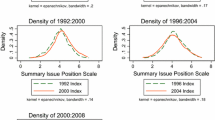Abstract
An ethnic polarization index is a summary statistic of ethnic diversity in a population. Reynal-Querol (J Confl Resolut 46:29–54, 2002) suggested an index of ethnic polarization, the RQ index, and discussed its properties. In this paper we develop two ethnic polarization orderings that can rank ethnic distributions in terms of all ethnic polarization indices satisfying certain intuitively reasonable postulates. Some of these postulates and some additional ones taken from the earlier literature are employed to develop some axiomatic characterizations of the RQ index. In the process, a generalized form of the RQ index is also characterized.
Similar content being viewed by others
References
Alesina A, Baqir R, Easterly W (1999) Public goods and ethnic divisions. Q J Econ 114: 1243–1284
Alesina A, La Ferrara E (2000) Participation in heterogeneous communities. Q J Econ 115: 847–904
Alesina A, La Ferrara E (2005) Ethnic diversity and economic performance. J Econ Lit 43: 762–800
Bossert W, D’Ambrosio C, La Ferrara E (2011) A generalized index of fractionalization. Economica 78: 723–750
Braubaker R, Laitin DD (1998) Ethnic and nationalist violence. Ann Rev Sociol 24: 423–452
Chakravarty SR (2009) Inequality, polarization and poverty: advances in distributional analysis. Springer, New York
Chakravarty SR, D’Ambrosio C (2010) Polarizqation orderings of income distributions. Rev Income Wealth 56(1): 47–63
Chakravarty SR, Majumder A (2001) Inequality, polarization and welfare: theory and applications. Australian Econ Pap 40: 1–13
Chakravarty SR, Majumder A, Roy R (2007) A treatment of absolute indices of polarization. Jpn Econ Rev 58: 273–293
Chakravarty SR, Maharaj B (2011) Measuring ethnic polarization. Soc Choice Welf 37: 431–452
de la Vega MCL, Urrutia AM (2006) An alternative formulation of the Esteban-Gradin-Ray extended measure of bipolarization. J Income Distrib 15: 42–54
de la Vega MCL, Urrutia AM, Diez H (2010) Unit consistency and bipolarization of income distributions. Rev Income Wealth 56: 65–83
Desmet K, Ortunoâ-Ortin I, Weber S (2008) Stability of nations and genetic diversity. Working paper 004-08, International School of Economics at TSU, Tbilisi, Republic of Georgia
Desmet K, Ortuño-Ortín I, Wacziarg R (2011) The political economy of ethnolinguistic cleavages. J Develop Econ (forthcoming)
Duclos J-Y, Esteban J, Ray D (2004) Polarization: concepts, measurement, estimation. Econometrica 72: 1737–1772
Easterly W, Levine R (1997) Africa’s growth strategy: policies and ethnic divisions. Q J Econ 111: 1203–1250
Esteban JM, Ray D (1994) On the measurement of polarization. Econometrica 62: 819–851
Esteban JM, Ray D (1999) Conflict and distribution. J Econ Theory 87: 389–415
Esteban JM, Ray D (2008) On the salience of ethnic conflict. Am Econ Rev 98: 2185–2202
Esteban JM, Ray D (2008) Polarization, fractionalization and conflict. J Peace Res 45: 163–182
Esteban JM, Ray D (2009) Linking conflict to inequality and polarization. CSIC, Barcelona
Esteban JM, Gradin C, Ray D (2007) An extension of a measure of polarization, with an application to the income distribution of five OECD countries. J Econ Inequal 5: 1–19
Fearon JD (2003) Ethnic and cultural diversity by country. J Econ Growth 8: 195–222
Fearon JD, Laitin DD (2000) Violence and the social construction of ethnic identity. Int Organ 54: 845–877
Foster JE, Wolfson MC (2010) Polarization and the decline of the middle class: Canada and the US. J Econ Inequal 8: 247–273
Gradin C (2000) Polarizations by subpopulations in Spain, 1973–1991. Rev Income Wealth 48: 457–474
Hardy GH, Littlewood J, Polya G (1934) Inequalities. Cambridge University Press, Cambridge.
Harff B (2003) No lessons learned from holocaust? Assessing risks of genocide and political mass murder since 1955. Am Political Sci Rev 97: 7–73
Horowitz D (1985) Ethnic groups in conflict. University of California Press, Berkeley
Montalvo JG, Reynal-Querol M (2005) Ethnic polarization, potential conflict and Civil Wars. Am Econ Rev 95: 796–816
Montalvo JG, Reynal-Querol M (2008) Discrete polarization with an application to the determinants of genocides. Econ J 118: 1835–1865
Mauro P (1995) Corruption and growth. Q J Econ 110: 681–712
Reynal-Querol M (2002) Ethnicity, political systems and civil wars. J Confl Resolut 46: 29–54
Rodriguez J, Salas R (2003) Extended bipolarization and inequality measures. Res Econ Inequal 9: 69–83
Rudin W (1987) Principles of mathematical analysis. McGraw Hill, London
Silber J, Deutsch J, Hanoka M (2007) On the link between the concepts of kurtosis and bipolarization. Econ Bull 4: 1–6
Spolaore E, Wacziarg R (2009) War and relatedness. NBER working papers 15095, National Bureau of Economic Research, Inc
Vigdor JL (2002) Interpreting ethnic fragmentation effects. Econ Lett 75: 271–276
Wang YQ, Tsui KY (2000) Polarization orderings and new classes of polarization indices. J Public Econ Theory 2: 349–363
Wolfson MC (1994) When inequalities diverge American. Econ Rev Pap Proc 84: 353–358
Wolfson MC (1997) Divergent inequalities: theory and empirical results. Rev Income Wealth 43: 401–421
Zhang X, Kanbur R (2001) What differences do polarization measures make? An application to China. J Develop Stud 37: 85–98
Author information
Authors and Affiliations
Corresponding author
Additional information
The authors thank Biswarup Das, Jean-Yves Duclos, Joan Esteban and two anonymous referees of this journal for their helpful comments and suggestions.
Rights and permissions
About this article
Cite this article
Chakravarty, S.R., Maharaj, B. Ethnic polarization orderings and indices. J Econ Interact Coord 7, 99–123 (2012). https://doi.org/10.1007/s11403-011-0084-z
Received:
Accepted:
Published:
Issue Date:
DOI: https://doi.org/10.1007/s11403-011-0084-z




